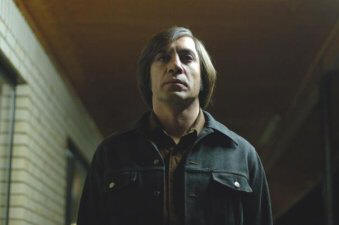 The writing and directing team of Joel and Ethan Coen are at their best when dealing with the subject of crime. From their early films like the caper comedy Raising Arizona to the Prohibition gangland drama Miller’s Crossing to the modern day setting of the darkly comic Fargo, the Coens have examined, sometimes comedically, sometimes dramatically, the motivations to and consequences of breaking the law.
The writing and directing team of Joel and Ethan Coen are at their best when dealing with the subject of crime. From their early films like the caper comedy Raising Arizona to the Prohibition gangland drama Miller’s Crossing to the modern day setting of the darkly comic Fargo, the Coens have examined, sometimes comedically, sometimes dramatically, the motivations to and consequences of breaking the law.
Their latest film, No Country For Old Men, adapted from Cormac McCarthy‘s novel, seems at once like a culmination of their thematic explorations and also a break with their earlier work. When Llewelyn Moss (Josh Brolin) is out hunting near the Rio Grande River, he comes across the site of a drug deal gone bad. Both sides have shot each other to death, leaving a suitcase with two million dollars. Llewelyn takes the case, believing that no one will miss it. But the case is indeed missed and those who want it back dispatch hitman Anton Chigurh (Javier Bardem) to retrieve it and eliminate Llewelyn. Tangentially drawn into the wake of Chigurh’s pursuit is Sheriff Ed Tom Bell (Tommy Lee Jones),
The Coens’ directorial work is much more restrained than it normally is, with the film’s pacing as slow and steady as Tommy Lee Jones’s Texas drawl. Scenes unfold slowly, almost leisurely as if the camera is waiting to discover the next moment that will move the story forward. It is a technique that the Coens use to perform a very interesting piece of slight-of-hand, shifting the film’s focus from Llewelyn to Sheriff Bell. This may throw some people when the movie suddenly begins to reveal incidences that happened to Llewelyn after the fact, but the point of view shift works because the film is not so much concerned with Llewelyn’s plight or whether Sheriff Bell will catch up to Llewelyn and Chigurh, than it is with the impact that hired hitman Chigurh has on their lives and the lives of those they come in contact with.
 Bardem’s cold and calculating killer Anton Chigurh is perhaps one of the most powerful performances seen this year. He doesn’t dominate the screen with overblown histrionics. Instead, he makes Chigurh a force of nature, always moving forward unstoppable. He believes that those people who he is called upon to kill have brought these circumstances upon themselves and he is just the instrument to deliver them to their fate. However, when faced with the possibility of having to kill someone not in the line of his work, he lets a coin flip decide their fate, again removing his own free will from his actions. It is the mechanism that he uses to keep himself clinically detached and unmoved by his victims’ pleadings for their lives. Indeed, Chigurh seems so detached that it is hard to imagine how he would spend any of his time not on the job outside of just staring at a wall, waiting for his next assignment.
Bardem’s cold and calculating killer Anton Chigurh is perhaps one of the most powerful performances seen this year. He doesn’t dominate the screen with overblown histrionics. Instead, he makes Chigurh a force of nature, always moving forward unstoppable. He believes that those people who he is called upon to kill have brought these circumstances upon themselves and he is just the instrument to deliver them to their fate. However, when faced with the possibility of having to kill someone not in the line of his work, he lets a coin flip decide their fate, again removing his own free will from his actions. It is the mechanism that he uses to keep himself clinically detached and unmoved by his victims’ pleadings for their lives. Indeed, Chigurh seems so detached that it is hard to imagine how he would spend any of his time not on the job outside of just staring at a wall, waiting for his next assignment.
On another level, the film seems to be a meditation on the inevitability of death, as personified by Bardem‘s Chigurh. Seemingly unstoppable and unkillable, Chigurh marches through this movie dealing out death to those who may or may not deserve it equally, a 1970s-coiffed Grim Reaper that can’t be bargained with. But despite this inevitability, the film in its final scenes suggests that there may be something beyond death, and that is what we must strive for while still among the living.



